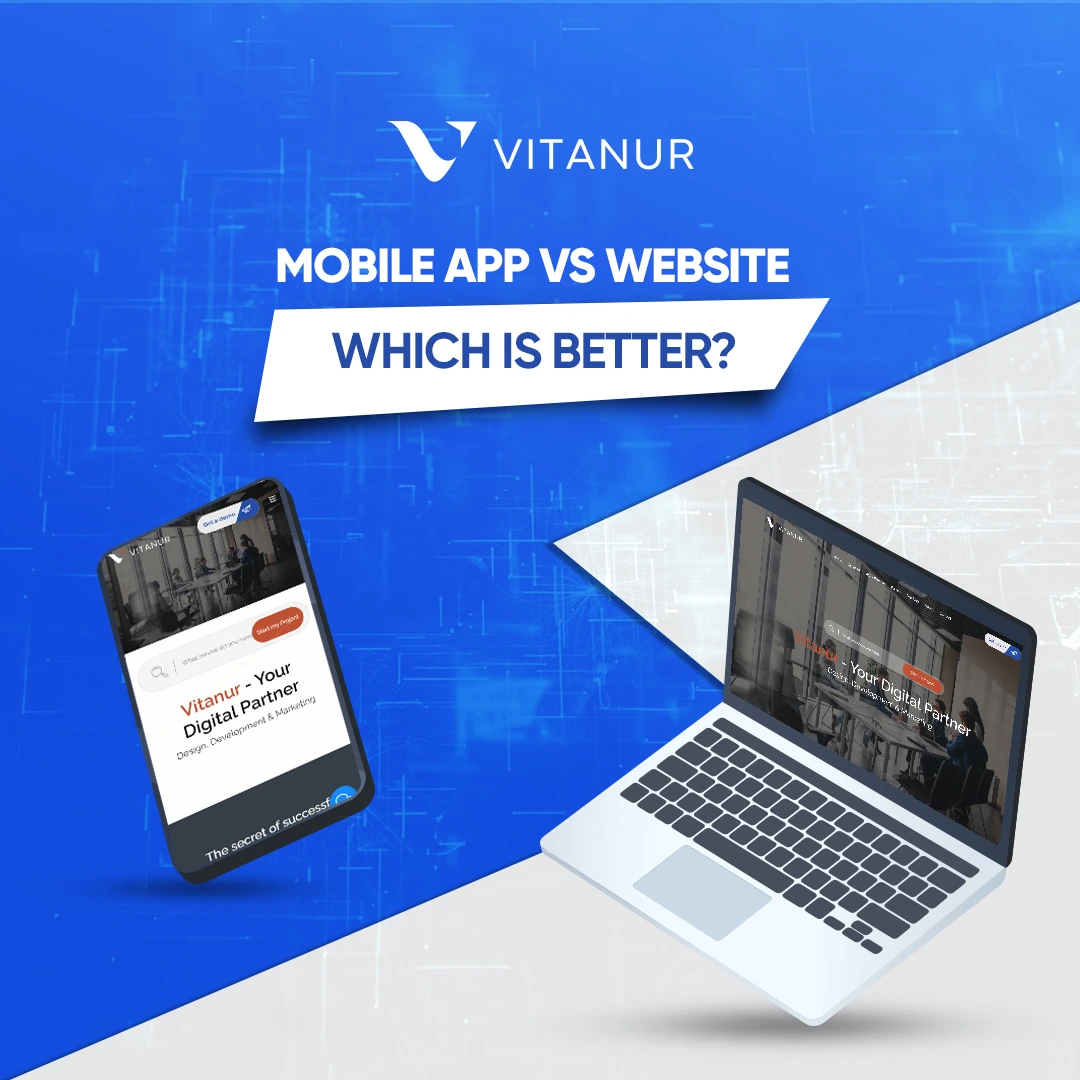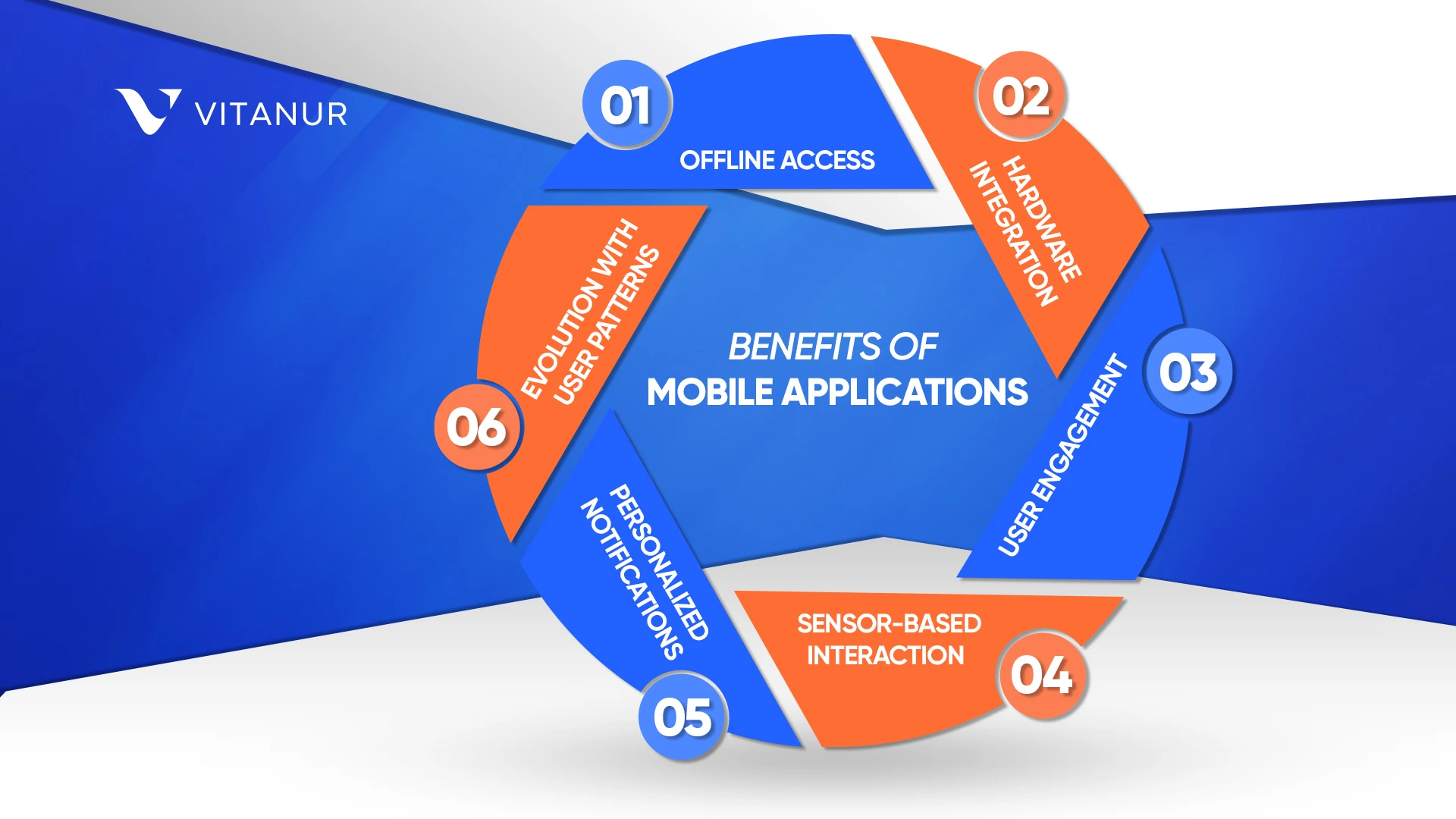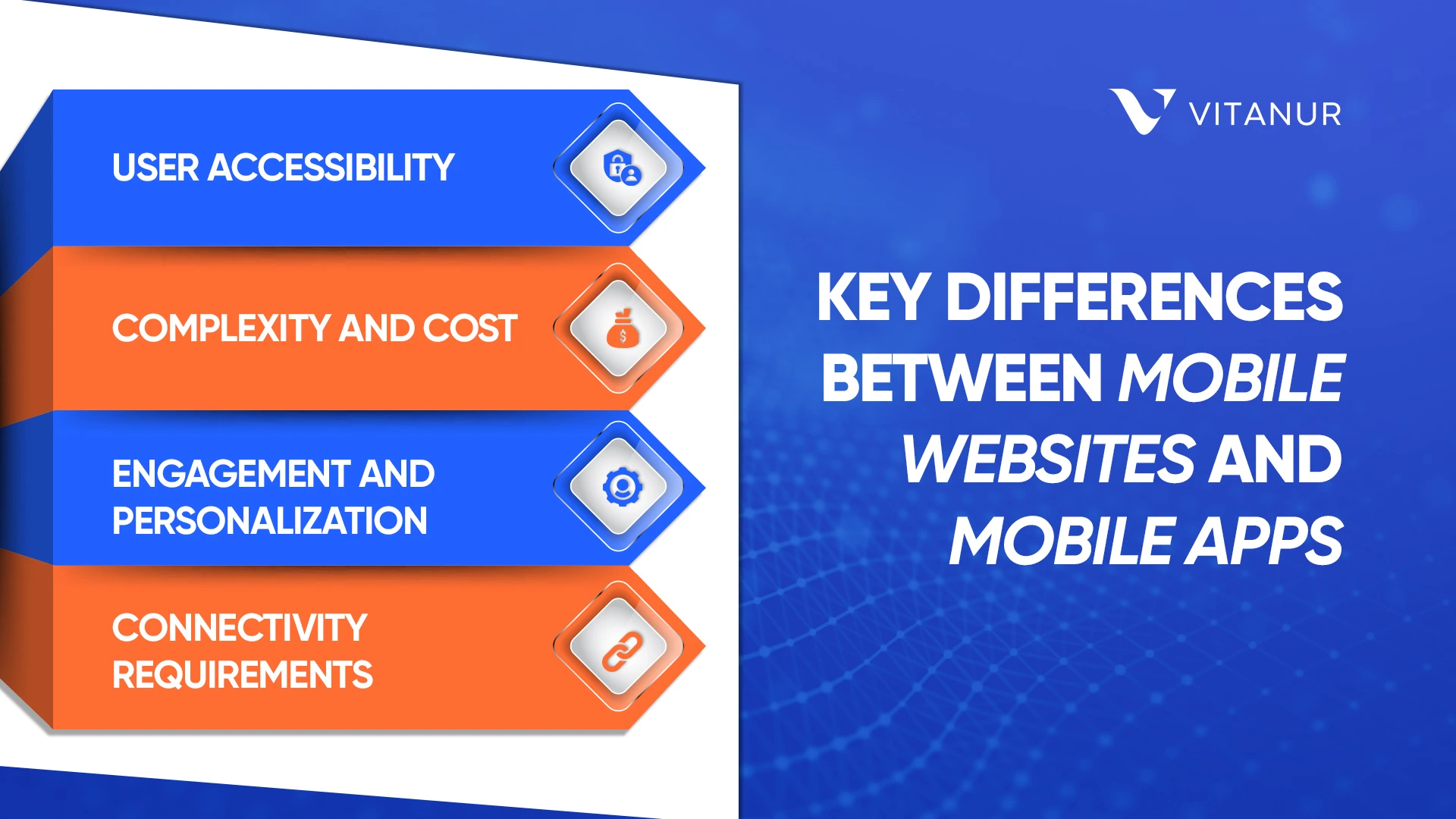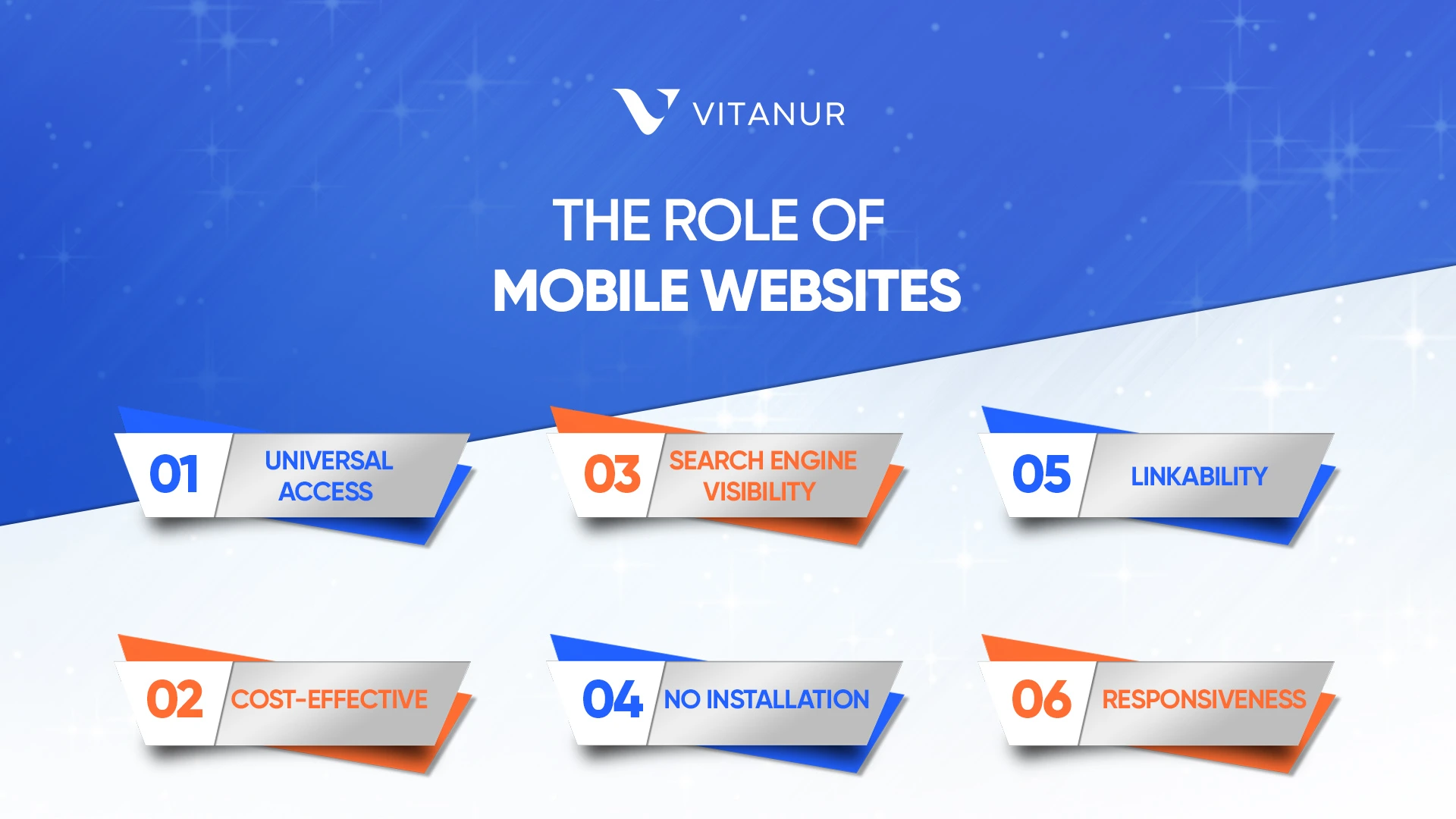Mobile App vs Website: Which is Better?
As businesses strive to carve out their corner of the digital landscape, one of the most essential decisions they must make is whether to channel their energies and resources into developing a mobile app or a website. It's a strategic choice with far-reaching implications for customer engagement and the overall digital footprint of a brand. On one hand, mobile apps offer users a highly personalized journey, tapping into the sophisticated capabilities of modern smartphones to deliver a more engaging user experience. On the other, websites provide the advantage of accessibility, opening the doors to anyone with internet access without the extra step of a download.

The decision-making process is nuanced and should be grounded in a clear understanding of a business’s target audience, financial parameters, and long-term digital strategy. If your target audience consists predominantly of younger, mobile-first consumers, an app could be the golden ticket to winning their attention and loyalty. However, if your aim is to maximize reach and ensure that your business is as discoverable as possible, especially through organic search, a well-optimized website might be the way to go. Budget is also a decisive factor; mobile apps come with a steeper price tag for development and maintenance, whereas websites can often be launched and scaled with more modest budgets. Crafting content with SEO in mind is crucial, ensuring that your chosen platform—be it a mobile app or a website—resonates with your audience and aligns with your business objectives, all while maintaining visibility in the vast ocean of online content.
Understanding the Basics of Mobile Application Development
At its core, mobile app development is as much an art as it is a science. It requires a symphony of technical skills, strategic design, and a deep understanding of user behavior. The creation of a mobile app is usually not the work of a lone programmer but rather a team of specialists. Developers fluent in Swift and Kotlin breathe life into apps for IOS and Android devices, respectively, crafting code that speaks directly to the hardware it lives on. But the journey doesn't stop at launch. A crucial phase of development is navigating the meticulous policies of app stores—Apple's App Store and Google's Play Store each have their own set of rules and standards that ensure the apps we download are safe, reliable, and meet a certain quality standard.
Exploring the Benefits of Mobile Applications
The magnetic appeal of mobile apps is rooted in their multifaceted benefits, creating an immersive and continuous digital interaction. Here's a breakdown of the key features that give mobile apps their edge:

-
Offline Access: One of the most user-centric features of mobile apps is the ability to operate without a constant internet connection. Users can indulge in various activities such as listening to their favorite songs, editing documents, or browsing through saved information, all without being online. This feature is a game-changer for ensuring round-the-clock engagement.
-
Hardware Integration: Apps take full advantage of smartphone hardware, offering functionalities beyond basic usage. For example, fitness apps harness the accelerometer for tracking physical activity, and augmented reality apps transform how we interact with the world through our camera lens. With GPS integration, apps deliver location-specific services, enriching the user experience. The power of push notifications also stands out, providing immediate and relevant updates directly to the user, a strategic edge that websites often lack.
-
User Engagement: Sensor Tower’s data underscores the pivotal role of mobile apps in the digital age, with users dedicating over 3.1 trillion hours to app engagement in 2021 alone. This statistic signifies a growing dependence on the personalized and integrated nature of app functionalities, aligning with the user's daily lifestyle.
-
Sensor-Based Interaction: Phones' built-in sensors are not just components; they're gateways to enhanced interaction within apps. Health apps counting steps or gaming apps responding to your device's movements offer uniquely engaging experiences, setting mobile apps apart from traditional websites.
-
Personalized Notifications: The immediacy of app notifications allows businesses to connect with their audience in real-time. Whether it’s an exclusive offer or an important alert, users receive this information instantly, fostering a stronger and more immediate connection between the user and the app.
-
Evolution with User Patterns: Mobile apps are not static; they evolve with users’ changing habits. This evolution has made them indispensable in daily life, from managing tasks to providing entertainment.
In summary, the innovative force of mobile apps is revolutionizing the way users interact with technology. Far from being mere content platforms, they have become essential tools in managing daily life, with their ability to offer tailored, engaging, and versatile experiences. With the digital landscape increasingly skewed towards mobile, businesses tapping into the potential of mobile apps are not just staying relevant; they're leading the charge in offering solutions that resonate on a personal level with their customers.
Leveraging Mobile Applications for Business Success
The transformative power of mobile applications in business is undeniable, backed by compelling statistics from App Annie. The average user spends a robust 4.2 hours daily on apps, indicating a massive shift in where consumers are focusing their attention. This surge in app engagement opens a valuable portal for businesses to not only reach their target audience but to forge deeper connections through customized content, loyalty incentives, and immediate support.
Such user dedication offers a rich landscape for varied business initiatives like strategic marketing, direct sales, and user experience enhancements. It also allows for the collection of critical analytics, providing insights that are essential for informed decision-making and strategic planning. A meticulously designed app serves as a potent element in a brand’s toolkit, amplifying visibility, reinforcing user commitment, and propelling growth. With the digital terrain veering increasingly towards app usage, companies leveraging mobile app advantages are poised to excel in this dynamic, app-driven marketplace.
Unveiling the World of Website Development
In the digital era, establishing an online presence is not just an option for small businesses—it's a critical step towards sustainable growth. While mobile apps are making significant strides in the digital space, the importance of having a robust website cannot be understated.
The Advantages of Having a Website for Small Businesses
For the small business owner, a website acts as the primary touchpoint for customer discovery and engagement. Here are some of the key benefits:
-
Round-the-Clock Accessibility: A website operates non-stop, transcending time zones and geographical barriers, providing a perpetual showroom for products or services.
-
Cost Efficiency: When considering return on investment, a website can prove more economical than physical expansions, offering global outreach without the need for a physical presence.
-
Enhanced Discoverability: In the age of Google searches and online reviews, having an SEO-optimized website is paramount to increase a business’s visibility and to attract organic traffic.
-
Expansion of Market: The internet's global reach allows small businesses to access overseas markets, which were once inaccessible due to traditional marketing constraints.
-
Insightful Customer Data: Modern websites can be integrated with sophisticated analytics tools that can track user interaction and provide invaluable data to tailor business strategies and offerings.
Best B2B Web Design Styles to Boost Your Online Presence
In the B2B sector, a website is not just a showcase of services, it is the hub of professional interaction and transaction. A well-designed website can significantly influence purchasing decisions:
-
Interactive and User-Friendly Design: Features like interactive chatbots, responsive design, and intuitive navigation can elevate user experience, driving engagement and conversions.
-
Storytelling through Design: A compelling narrative told through the website design can engage visitors, reflect brand values, and differentiate the company in a crowded marketplace.
-
Clear and Actionable CTAs: Strategic placement of calls-to-action can guide potential clients through the sales funnel, encouraging them to engage with content, request information, or reach out for services.
-
Robust Security Measures: Demonstrating a commitment to security through SSL certificates and other measures is non-negotiable, not just for gaining customers’ trust but also for protecting sensitive data.
The integration of mobile applications and websites presents a synergistic approach to digital marketing, where each has a distinct role in funneling and retaining customer engagement. A mobile app might offer a bespoke user experience and push notifications to keep customers engaged, while a website can serve as a broad-reaching tool for initial discovery and information dissemination. Small businesses must recognize the intrinsic value that a well-developed website brings, acting as a foundation for building an expansive and accessible online presence that can work in tandem with the focused, user-centric approach of mobile applications.In the contemporary digital era, website development emerges as a cornerstone for businesses, anchoring their online presence and serving as a gateway for customer interaction. This virtual real estate is not just a mere representation of a company's brand online; it is a dynamic and interactive platform that can significantly enhance visibility and credibility, especially for small businesses.
Decoding the Differences: Mobile App vs Website
Choosing the optimal platform for digital interaction with customers is a pivotal decision for businesses aiming to thrive in the internet age. While we’ve previously delved into the myriad benefits that websites bring to small businesses, a comprehensive digital strategy often requires evaluating the distinct functionalities and advantages that mobile apps provide. As companies weigh their options, understanding the unique offerings of each platform is key to optimizing their digital footprint.
Key Differences Between Mobile Websites and Mobile Apps
The landscape of digital engagement is diverse, with mobile websites and apps offering different paths to reach and serve users. These platforms are not mere alternatives but are fundamentally different tools in a business's arsenal.

-
User Accessibility: Mobile websites promise immediate access, with no barriers to entry such as downloads, making them a quick and easy option for first-time interactions with a business.
-
Complexity and Cost: The journey to market can differ vastly between these two; websites can be more straightforward to launch and maintain, with no app store hurdles or device compatibility issues to navigate.
-
Engagement and Personalization: When it comes to forging deeper connections, mobile apps can be meticulously crafted to offer personalized experiences, tapping into the full suite of smartphone capabilities.
-
Connectivity Requirements: Mobile apps can bridge the gap in connectivity, allowing users to access content in the absence of an internet connection, whereas mobile websites require a constant connection for content delivery.
Consumer Perspective: Which is Better - Mobile App or Website?
Consumers’ preferences can vary as much as the features offered by mobile apps and websites, with choices influenced by their individual needs and the context of their online activities.
-
Convenience for Casual Use: Websites typically cater to users seeking quick, hassle-free access to information or services, making them a preferred choice for those not wishing to commit to an app download.
-
Depth of Interaction: For more regular, in-depth use cases, an app may offer a richer, more user-centric experience with personalized settings and notifications.
-
Data Usage: Data-conscious consumers may lean towards apps, which can provide many services without the continuous data exchange required by website use.
-
Security and Privacy: Concerns over data privacy may lead some consumers to favor websites, which typically ask for less personal information than apps.
For a business, an online presence anchored by a strong website can lay the groundwork for brand visibility. On the other hand, integrating a mobile app can be a game-changer for customer engagement, offering tailored experiences that drive loyalty and retention. Businesses must thus navigate these differences with a clear strategy, leveraging the respective strengths of mobile apps and websites to create a holistic and impactful online presence that serves their audience effectively.
Navigating the Design Landscape: UX Differences
In our exploration of digital strategy, we've illuminated the distinct advantages of both mobile applications and websites for businesses. Carrying this conversation forward, it’s essential to delve into the design intricacies that define the user experience (UX) on each platform.
Understanding UX Differences in Design: Responsive Website vs. Mobile App
The UX journey on mobile applications and responsive websites is guided by differing design philosophies and user expectations. Responsive design ensures that a website is easily navigable across various devices, adapting layout and functionality to smaller screens without sacrificing usability. This fluidity is crucial for users who switch between devices and expect a consistent experience.
On the flip side, mobile apps offer a more bespoke UX, designed from the ground up with mobile functionality in mind. These platforms often allow for a higher degree of interactivity and take advantage of device capabilities like camera integration, offline access, and personalized alerts. Apps can offer immersive experiences that are not just responsive but inherently mobile-centric.
Important Considerations for Designing a Mobile-Friendly Website and App
When designing a mobile-friendly website, the focus is on adaptability and streamlined functionality. It’s about ensuring that content is legible, load times are swift, and navigation is intuitive on a smaller screen. The UX should cater to the user on the go, delivering information swiftly and facilitating effortless interactions.
Conversely, the design of a mobile app must take into account not just aesthetic appeal but also the leverage of native device features to enhance UX. For instance, the design should seamlessly integrate with touch gestures like swiping and tapping, which are second nature to the mobile user.
While responsive websites provide a universally accessible platform, mobile apps can create an environment tailored to user habits and preferences, offering personalized pathways through push notifications and custom settings. Both require a thorough understanding of the end-user to deliver a seamless and engaging experience.
As we merge the insights gathered from the stark differences between mobile apps and websites, it becomes clear that successful UX design is not about choosing one over the other. It's about crafting each to meet specific user needs and business goals, ensuring that every interaction feels intuitive, effective, and rewarding. Whether through a responsive website that caters to broad accessibility or a feature-rich app that enhances daily routines, the aim is to provide a cohesive UX that resonates with users and aligns with the overarching digital strategy of the business.
Website and Mobile App Development Insights
Expanding on the multifaceted nature of digital presence, we delve deeper into the nuanced roles that websites and mobile apps play in the digital strategy of a business. Each serves as a unique touchpoint in the customer journey, and together, they form a cohesive narrative of brand identity and user engagement.
The Role and Purpose of Mobile Websites
Mobile websites are an integral component of the online ecosystem, serving as a primary interface for users interacting with a brand or business on their smartphones or tablets. The role and importance of a mobile website are multifaceted:

-
Universal Access: Mobile websites are designed to be accessible on any device with a web browser, providing a broad and inclusive reach that ensures anyone can access the content or services offered, regardless of the device they own.
-
Search Engine Visibility: They are indexable by search engines, which is crucial for organic search visibility. This visibility is key for driving traffic, as a mobile-optimized website is more likely to rank higher in search results on platforms like Google.
-
Linkability: Unlike apps, which require a download, mobile websites can be easily shared among users via a link. This ease of distribution can significantly increase a brand’s discoverability.
-
Instant Updates: Any changes or updates made on a mobile website are immediate and visible to all users, ensuring that the most current version is always accessible without requiring users to download updates as with mobile apps.
-
Cost-Effective Solution: Developing and maintaining a mobile website can be more cost-effective compared to an app, especially when targeting a broad audience.
-
No Installation Required: Users can access a full range of features without the need to install anything on their device, which can be a barrier for app adoption.
-
Adaptability and Responsiveness: A well-designed mobile website adapts to the screen size and orientation of a wide range of devices, providing an optimal user experience.
When considering the role of mobile websites in conjunction with the previous discussions on mobile apps, it's evident that each serves a unique purpose in the digital strategy of a business. While apps may offer a more personalized and interactive experience, mobile websites stand as the universal point of contact for new and returning users alike, offering a seamless and immediate way to engage with content. Thus, businesses looking to maximize their online presence should strive for a harmonious balance between the two, ensuring a cohesive and comprehensive digital footprint.
Mobile Applications: A Deep Dive into Functionality
Whereas a mobile website might be likened to a digital handshake, a mobile application can be thought of as a business's signature performance—polished, purpose-driven, and tailored to the audience. The functionality of mobile apps is defined by the ability to leverage device-specific hardware and software capabilities, creating an ecosystem where efficiency and personalization thrive. From push notifications that bring timely updates to immersive experiences that harness the full potential of modern smartphones, mobile apps represent a business's commitment to staying connected with its user base in the most direct way possible.
Exploring the Purpose of Mobile Apps vs. Mobile Websites
Contrasting the expansive nature of mobile websites with the concentrated focus of mobile apps illuminates the strategic purpose behind each. Mobile websites are the starting point of a digital relationship, offering broad-reaching content designed to educate, inform, and entice. They are the springboards that launch users into the more intimate world of the mobile app, where engagement deepens and interactions become more frequent and personalized. This transition from the open arms of a website to the focused embrace of an app is pivotal in cultivating customer loyalty and fostering ongoing engagement.
Things to Remember When Designing for Both: Website and Mobile App
Crafting a seamless experience between a mobile website and an app is an art in itself. While a website needs to be fluid, responsive, and universally accessible, reflecting the broad values of the brand, an app must be intuitive, engaging, and responsive to the nuanced needs of its users. Designers and developers must keep in mind the individual journey a user takes—from the first click on a website to the daily interactions with an app. This journey should be smooth, with each step logically leading to the next, ensuring that users feel valued and understood throughout their digital engagements with the brand.
Connecting back to our prior discussion on the symbiotic relationship between mobile apps and websites, it's clear that one cannot stand without the other in today's market. A business's digital strategy must be all-encompassing, recognizing that a user might start their journey on a website but will find true value in the personalized experience an app offers. It's about creating a digital ecosystem where each component complements the other, leading to a harmonious user experience that resonates with customers and stands the test of time.
Choosing between a mobile app and a website is a strategic decision that can shape the future of your business. If you're contemplating this pivotal move, consider partnering with Vitanur, your ally in custom website and mobile app development. With a keen eye for SEO optimization and user engagement, Vitanur crafts digital solutions that resonate with your audience and amplify your brand's voice in the online world.
Imagine an interactive mobile app that fits right into your customer's lifestyle or a website that captures the essence of your brand while climbing the search engine rankings. Vitanur's approach is to blend innovative design with strategic SEO, ensuring that your digital presence is not just visible but also impactful. Whether it's the seamless user experience of a mobile app or the expansive reach of a website, Vitanur's expertise is your resource for digital success.
Seize the chance to uplift your brand's presence. Connect with Vitanur for a collaborative digital venture that ensures the creation of an engaging mobile app or a commanding website, tailor-made to captivate your clientele and distinguish you within the vibrant digital market. Start your path to an impressive online presence with us today.




Write a comment
Your email address will not be published. Required fields are marked *